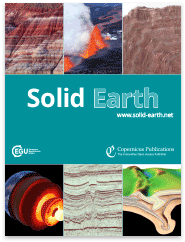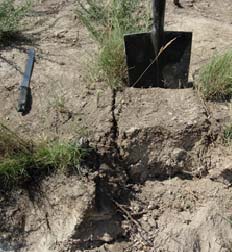
León J, Seeger M, Badía D, Peters P, Echevarría T: Thermal shock and splash effects on burned gypseous soils from the Ebro Basin (NE Spain). Solid Earth, 5, 131-140. DOI: 10.5194/se-5-131-2014.
Abstract
Fire is a natural factor of landscape evolution in Mediterranean ecosystems. The middle Ebro Valley has extreme aridity, which results in a low plant cover and high soil erodibility, especially on gypseous substrates. The aim of this research is to analyze the effects of moderate heating on physical and chemical soil properties, mineralogical composition and susceptibility to splash erosion. Topsoil samples (15 cm depth) were taken in the Remolinos mountain slopes (Ebro Valley, NE Spain) from two soil types: Leptic Gypsisol (LP) in a convex slope and Haplic Gypsisol (GY) in a concave slope. To assess the heating effects on the mineralogy we burned the soils at 105 and 205 °C in an oven and to assess the splash effects we used a rainfall simulator under laboratory conditions using undisturbed topsoil subsamples (0–5 cm depth of Ah horizon). LP soil has lower soil organic matter (SOM) and soil aggregate stability (SAS) and higher gypsum content than GY soil. Gypsum and dolomite are the main minerals (>80%) in the LP soil, while gypsum, dolomite, calcite and quartz have similar proportions in GY soil. Clay minerals (kaolinite and illite) are scarce in both soils. Heating at 105 °C has no effect on soil mineralogy. However, heating to 205 °C transforms gypsum to bassanite, increases significantly the soil salinity (EC) in both soil units (LP and GY) and decreases pH only in GY soil. Despite differences in the content of organic matter and structural stability, both soils show no significant differences (P < 0.01) in the splash erosion rates. The size of pores is reduced by heating, as derived from variations in soil water retention capacity.
Solid Earth
Solid Earth (SE) is an international scientific journal dedicated to the publication and discussion of multidisciplinary research on the composition, structure and dynamics of the Earth from the surface to the deep interior at all spatial and temporal scales. More at Solid Earth homepage.

